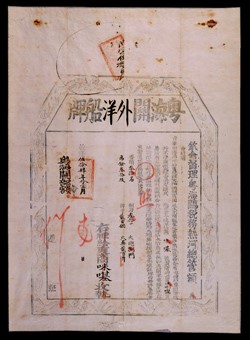By Sam S., John Winthrop Fellow
Every year, the MHS selects one or more high school students as recipients of the John Winthrop Student Fellowship. This award encourages high school students to make use of the nationally significant collections of the MHS in a research project of their choosing. Applications for the 2022 Student Fellowships will open in December 2022. Learn more and apply!
This year, John Winthrop Student Fellow Sam S., who attends Nobles and Greenough in Dedham, has created a podcast to talk about the history of trade between China and the United States, focusing on trade relations between 1794 and 1900.
I had been interested in the topic of Chinese-American relations for a while so the opportunity to research this topic in depth was exciting. Once I was accepted I eagerly began reading several books to develop a strong background to help contextualize my later research. During my first meeting with the Massachusetts Historical Society I planned to make an entire series of podcasts covering most of the timeline of Chinese-American relations.
One of the first things I did to find resources from their archives was to search for “China” in their online collection guides. From here I was able to identify the Forbes papers. I brought up these papers in my next meeting with (Asst. Director of Education) Kate Melchior from the MHS where we talked about narrowing the focus of the podcast. She mentioned that the MHS had a podcast where they focused each episode on one specific piece from their archives which made me think that for my podcast I could do the same but perhaps not quite as extreme.

All foreign traders shipping cargo out of Canton, China, were obliged to observe a complex series of customs. This grand chop states that all proper duties have been paid for the Astrea, enabling the ship to continue travelling down river.
When I finally visited the archives the librarians there showed me how to view the microfilm that the Forbes papers were copied onto. I used the index of the papers to find the letters and notes within the collection that were most relevant to Chinese-American relations which I took pictures of and transcribed for late use. One specific letter from the mid 19th century from John Forbes, an American merchant, to Houqua, a Chinese merchant, was especially helpful. It showed that early American merchants were able to form strong connections with their Chinese counterparts through trade.
As I was finishing my last book at the same time, it mentioned a lecture given by John Quincy Adams at the MHS itself. In my next meeting with Kate Melchior I brought this up and she managed to find the approximate date of this lecture. When I visited the MHS again, I asked one of the librarians about this and she was able to find an original newspaper that published the transcript of this lecture. This ended up being one of the most important parts of my podcast because Adam’s discussion about the opium wars through the lens of promoting free trade helped highlight the importance of trade to America but also the often self-serving nature of their relations with China. Because of this article I ended up focusing on making the script for one podcast episode on the role of specifically trade in Chinese-American relations pre 1900.
For any students who are interested in becoming student fellows, my main advice would be to make sure you specify your topic over the course of your research, use primary sources to help your argument, take advantage of the check ins, and make sure to put enough time aside if you’re looking at handwriting sources because they take some extra thinking to read. With my podcast I hope to inform people about Chinese-American relations pre 1900 as my topic suggests and I think it also provides a respectable background for learning about and contextualizing relations post 1900.

